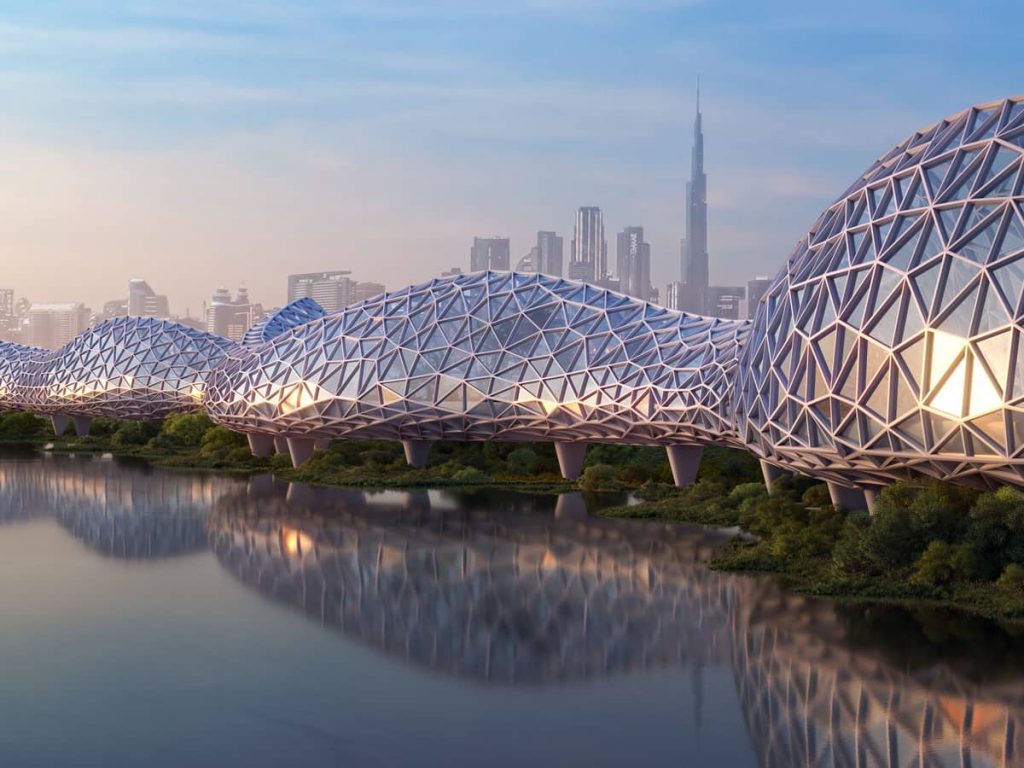[ad_1]
The world’s smartest cycling and running platform would be created by plans for a 93 km sustainable urban roadway in Dubai.
According to developer URB, The Loop is a year-round climate-controlled building intended to encourage cycling and walking as Dubai residents’ main modes of transportation.
The Loop, which houses a zero-emissions transportation system, would be run entirely on renewable energy due to kinetic flooring. It would be a multipurpose facility with recreational options for both locals and guests.
Its snaking structure, which is intended to serve as a center for wellness tourism, might include a number of wellness hotels placed along it. With a range of hotels at different price points, developers hope to accommodate all kinds of travelers. Additionally, there would be athletic fields and exercise centers.
“Dubai is the best place for entrepreneurship in urban mobility. The Loop project is an embodiment of that entrepreneurial spirit, which aims to make Dubai the most connected city on earth by foot or bike,” said URB chief executive Baharash Bagherian.
“In Europe, most people ride bicycles or walk to get to work. In Dubai, our aim is to get more than 80 percent of people to use a bike on a daily basis.”
The Loop, which would be housed in a curved glass building, would be covered in plants and feature a number of small parks, playgrounds, and allotments. Produce may be grown inside the building using vertical farms, increasing the amount of locally produced food available in the city.
The proposal is still at the research and development stage, but if it is approved, it may play a significant role in the city’s goals to reduce vehicle dependence by allowing urban inhabitants to walk or cycle to necessary amenities just a short distance from their houses. The plans align with Dubai’s goal of becoming one of the world’s most liveability.
There are several proposed routes for The Loop, including one that passes through the neighborhoods of Expo City, JLT, Al Quoz, Downtown Dubai, Meydan, and Academic City.
Developers told The National an exact route has yet to be confirmed and developers are finalizing “the best options for the project, this includes the final route, phasing and timelines”.
By the end of the year, the project’s first phase is anticipated to be completed.
If built, residents who use The Loop will be compensated for their daily cycling or step efforts. The more someone uses The Loop, the more rewards they will receive. Metrics would be tracked on an app.
“It will become the first active mobility infrastructure of its kind anywhere in the world, with various amenities and sustainability features that will shape the future of urban mobility in Dubai and beyond,” added Bagherian.
URB offers master planning and development management services with an emphasis on net zero sustainable cities. It launched plans for Agri Hub, a new agritourism project in Dubai’s desert that is expected to grow to be the largest of its kind in the entire globe, in December.
Other projects it is working on include Alnama Smart City in Riyadh, which will accommodate 44,000 people, and XZero City in Kuwait, a sustainable net zero city for 100,000 residents.
What are 20-minute cities: Dubai, Edinburgh, and Melbourne
Dubai’s goal to become a 20-minute city is suitable with The Loop.
According to the goal, which was announced last year, 55% of locals would reside within 800 meters of a mass transport station, enabling them to get to their daily necessities in little more than 20 minutes on foot or by bicycle.
According to research, most people are only willing to walk for a total of 20 minutes to fulfill their daily needs locally. This 20-minute trip is equivalent to walking 800 meters from your house to your destination and back again, or walking 10 minutes to your destination and another 10 back to your house.
With Paris having already revealed plans to strive to transform into a 15-minute city, a number of other locations across the world—including Edinburgh and Melbourne—are attempting to add 20-minute neighborhoods into their architecture.
[ad_2]
Source link

